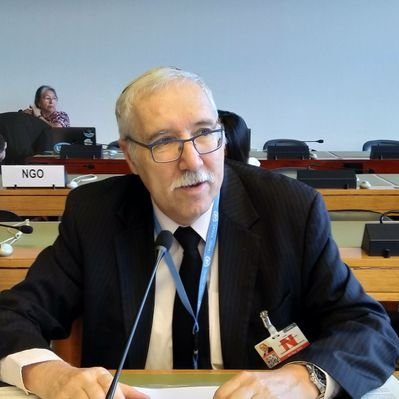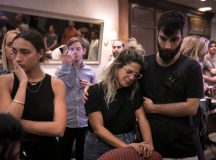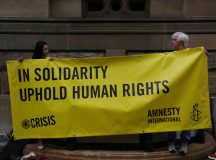Gerald M. Steinberg is emeritus professor of politics at Bar Ilan University and president of NGO Monitor.
The incomprehensible brutality of the 7 October Hamas pogrom launched a full scale war, both on the battlefield and in the parallel realm of soft-power and propaganda. Following the pattern developed over the past 20 years, the claimants to expertise and moral authority focused and continue to focus primarily on delegitimising the Israeli military response and preventing the defeat of Hamas. Using the language of human rights and international law, NGO officials are making repeated appearances on major media platforms, accompanied by thousands of social media posts and a torrent of authoritative-sounding statements. And as in the past, the vast majority condemn Israel for ‘war crimes,’ ‘disproportionate force’, ‘ethnic cleansing,’ ‘deliberate killing of civilians’, and similar accusations, join demands for an immediate ceasefire, and occasionally add a few token remarks on Israeli victims.
New York-based Human Rights Watch (HRW) is a key leader in this campaign. With an annual income of more than $100 million, HRW’s public relations team has been working full time to book their ‘experts’ on numerous television news programs, and marketing their propaganda campaign to journalists, politicians, and diplomats. When mobs attack Jewish targets on university campuses and on the streets of London, New York, Toronto, and Sydney, their chants and signs echo the HRW slogans.
The team of Sari Bashi (HRW’s senior program director) and Omar Shakir (Israel/Palestine Director) are leading this attack. Shakir and Bashi were hired by Ken Roth, HRW’s Executive Director from 1993 to 2022, and are continuing his legacy of using human rights and international law to promote the systematic demonisation of Israel. (In 2009, HRW founder Robert Bernstein condemned Roth and the organization for ‘turning Israel into a pariah state.’)
Following the massacre, HRW’s first public statement (Israel/Palestine: Devastating Civilian Toll as Parties Flout Legal Obligations), posted October 9, set the tone. After briefly acknowledging (with the qualifying ‘apparent’) Hamas’ ‘apparent deliberate targeting of civilians, indiscriminate attacks, and taking of civilians as hostages,’ the take-away is that ‘Israeli authorities have systematically repressed Palestinians for decades’ and ‘inhumane acts committed against Palestinians as part of a policy to maintain the domination by Jewish Israelis over Palestinians, amount to the crimes against humanity of apartheid and persecution’ (emphases added). According to HRW’s version of morality, the incomprehensible brutality of the Hamas massacres was somehow justified or at least requires contextualisation.
In HRW’s manipulated version of ‘international law,’ Hamas and Israel are, at best, indistinguishable – as per the title of the 9 October media statement and Omar Shakir’s key quote: ‘Deliberate killings of civilians, hostage-taking, and collective punishment are heinous crimes that have no justification … The unlawful attacks and systematic repression that have mired the region for decades…’ The language in this and the other statements repeat thousands of similar condemnations over the past 20 years, reflecting HRW’s consistent objective of leading the International Criminal Court to prosecute Israelis for war crimes. ICC prosecutions are the sine qua non in the process of uniquely delegitimizing Israel as an outlaw state.
As in other responses to brutal terrorism, as in the case of the American-led coalition after the 9/11 attacks, or in the war against ISIS, it is theoretically possible to debate proportionality, military necessity, difficulties in distinguishing between combatants and innocents, and similar complex questions, HRW does not engage in debate. Instead, they simply repeat the blanket assertions of Israeli “war crimes” and similar accusations, without at all considering alternatives, if they exist, to the adopted strategy. As a result, the substance of HRW’s contribution is not the realm of promoting public debate and legitimate criticism, but rather is a virulent form of soft-power warfare.
Continuously working towards this goal, Bashi, like Shakir, is a veteran propagandist, in the guise of a ‘human rights expert.’ In a tweet on that murderous afternoon of October 7, Bashi wrote, ‘There’s no honor in unlawful attacks on civilians. No matter how just your resistance to apartheid and oppression is.’ A few hours later she added, ‘For decades the US has ignored apartheid by Israeli authorities against Palestinians, sending weapons, giving visa deals to Israeli tourists and brokering normalization with Arab dictators. If only this war would persuade the US to address the abuses that are feeding the violence’ (emphases added).
The deluge of HRW post-massacre posts, interviews and solemn statements repeat the organisation’s standard menu of Israeli apartheid, war crimes, wrapped in authoritative-sounding manipulation of international law. Quoting the invented casualty claims of the Gaza ‘Health Ministry’, Shakir and Bashi know that these themes are automatically echoed in media platforms, and by politicians and academics. A few days after the brutal Hamas massacre, the repetitive slogans played a central role in steering media attention to attacking the Israel operation to rid Gaza of the Hamas terror infrastructure. Following the pattern of numerous previous Gaza mini-wars since 2009, the ‘humanitarian crisis’ caused by Israeli military operations would result in international demands for a ceasefire that would preserve the Hamas leadership and terror infrastructure.
As the propaganda campaign accelerated, HRW revived and amplified proven themes, such as the use of the term ‘collective punishment’ to demonise Israeli counterterror operations in Gaza. On 22 Octobe, this was the theme in Bashi’s ABC News interview, and on 23 October, among many others, and in an HRW media statement headlined ‘Israel Still Blocking Aid to Civilians in Gaza: Collective Punishment of Palestinians is a War Crime’.
In dozens of interviews and posts, Bashi and Shakir repeat accusations that Israel is withholding fuel to the civilians in Gaza, erasing the clear evidence that Hamas has stolen and stockpiled over one million litres, as well as food and water supplies. On 13 Octobe, Sari Bashi published an article in The New York Review titled ‘Nowhere to Go in Gaza‘ claiming, ‘The evacuation announcement risks mass forced displacement … in what amounts to a form of collective punishment—itself a war crime…’ This and others articles erase the reality that Hamas has used the Gaza population, estimated at between 1.5 and 2 million, as human shields to protect its arsenal of 30,000 rockets and vast underground tunnel system from destruction. For Bashi and HRW, this arsenal – all made from stolen humanitarian aid – is erased, as are the systematic war crimes on which Hamas’ strategy is based.
Tokenism and the sham appearance of artificial balance to fool uninformed virtue-signaling donors and journalists is another part of HRW’s soft-power war strategy. On October 18, HRW gave wide publicity to a video and accompanying statement (‘Israel/Palestine: Videos of Hamas-Led Attacks Verified’) claiming, ‘Human Rights Watch has verified four videos from the 7 October 2023 attacks by Hamas-led gunmen, showing three incidents of deliberate killings.’ With hundreds, if not thousands of far more comprehensive sources, HRW’s investment of resources into ostensibly ‘verifying’ three (!) incidents is the barest of fig leaves. And true to form, both the video and statement repeated the mantra that ‘for decades,’ Israel ‘has systematically repressed Palestinians.’ (For 20 years, a token appearance of balance has been a standard and successful feature in HRW’s strategy. In November 2002, they published a one-off report on Palestinian suicide bombing, after months of pressure from donors. Afterwards, this publication was barely mentioned while HRW led UN and other international campaigns condemning Israel for ‘war crimes’ in the IDF Jenin counterterror operation and called for bringing Israelis to trial before the International Criminal Court. Similar token reports were published on the 2006 Lebanon war, and in 2017, when the team of Bashi and Shakir published a one-off statement on two Israeli citizens with mental illness who crossed into Gaza and were held by Hamas.)
Perhaps at some point, journalists, government officials, HRW’s donors, and others will recognize the false accusations and obvious manipulation through token balance, and stop providing the organisation with platforms and funding to promote this destructive agenda. And perhaps the dissonance between HRW’s carefully manicured image of promoting morality and the blatant immorality of the organization’s Israel agenda will become too obvious to ignore. But until this happens, HRW will continue to lead the soft-power warfare that accompanies Hamas’ brutality.



































